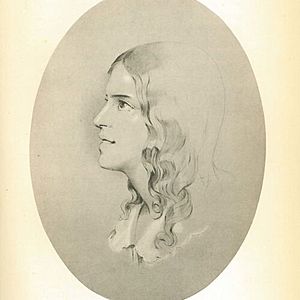Eliza Flower facts for kids
Eliza Flower (born in 1803, died December 12, 1846) was a talented British musician and composer. She was known for her own beautiful music. Eliza also had important friendships with famous people like William Johnson Fox, poet Robert Browning, and thinkers John Stuart Mill and Harriet Taylor.
Contents
Eliza Flower's Life Story
Eliza Flower was born in 1803 in Harlow, England. Her father, Benjamin Flower, was a journalist who wrote about new ideas. Her mother, Eliza Gould, helped others through charity work.
Eliza's younger sister was Sarah Fuller Flower Adams, who became a well-known poet. From a young age, Eliza showed a great talent for music and writing songs.
Eliza, her father, and her sister often wrote for a magazine called the Monthly Repository. This magazine was run by William Johnson Fox, a Unitarian minister. Unitarians are a group of Christians who believe in one God and emphasize reason and tolerance.
After her father passed away, Eliza and Sarah lived with Mr. Fox. They stayed with him until Sarah got married in 1834. Eliza continued to live there until she died in 1846. Mr. Fox was married but separated from his wife. Because Eliza and Mr. Fox lived together, some people in society talked about it, even though their friendship was proper. Eliza was also friends with John Stuart Mill, a politician and philosopher, and Harriet Taylor, who worked for women's rights.
Her Musical Works
Eliza Flower's first published music was Four Musical Illustrations of the Waverley Novels in 1831. For this, she wrote music for romantic songs by Sir Walter Scott, a famous writer.
She later wrote music for her sister Sarah's poems. This included the well-known hymn "Nearer, My God, to Thee". This hymn was part of a collection called Hymns and Anthems, put together by Mr. Fox. Her song Now pray we for our Country also became quite popular. She even wrote music for the funeral of Ram Mohan Roy, an important Hindu reformer.
During her lifetime, many music critics thought Eliza Flower was the best female composer. For example, the Musical Times magazine wrote in January 1846 that her sacred music was enjoyed by a very large audience at Crosby Hall.
Eliza Flower sadly passed away on December 12, 1846. She died from tuberculosis, a serious lung disease, while in Hurstpierpoint, near Brighton.
Friendship with Robert Browning
Eliza and her sister Sarah became friends with a young poet named Robert Browning. Robert's mother showed Eliza some of his early poems, written when he was only 12 years old. Eliza was impressed and showed them to Mr. Fox.
Mr. Fox also liked the poems but felt they weren't quite ready to be published. Robert Browning later destroyed these poems, along with many of his other early writings, in 1884.
Robert Browning admired Eliza Flower very much, even though she was nine years older than him. He remained fond of her until she died. She was even the inspiration for his poem called "Pauline."
Eliza Flower's Compositions
- 1831: Four Musical Illustrations of the Waverley Novels
- 1832: "The Gathering of the Unions"
- 1834: Songs of the Seasons
- 1841: Hymns and Anthems (which included "Nearer, My God, to Thee")
 | Emma Amos |
 | Edward Mitchell Bannister |
 | Larry D. Alexander |
 | Ernie Barnes |


